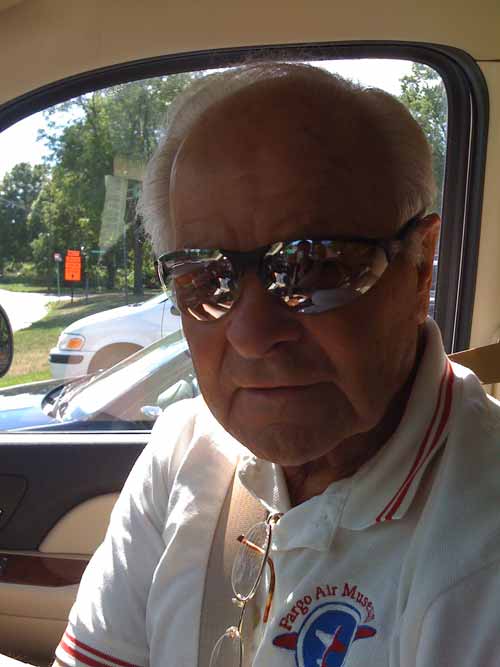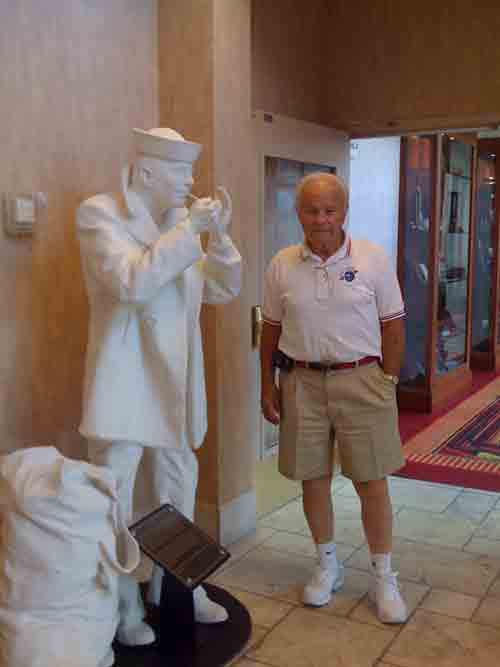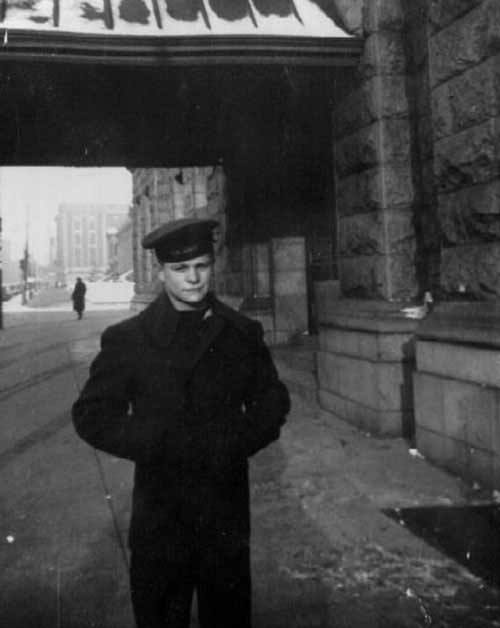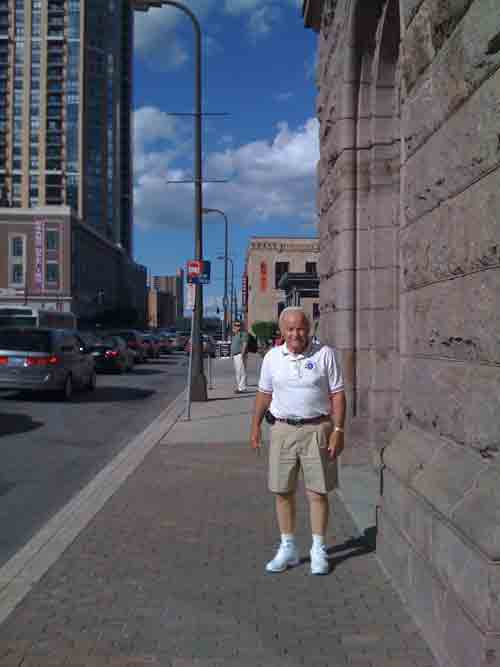
FRIDAY, AUGUST 8 Indigestion is making a very good case for not eating that thing at that place in this lifetime again, ever. You have to doff your cloque to a restaurant that’s 98 percent empty but still can’t get the food to you while it’s hot. It’s as if the waitress decided to whittle a mobius strip out of a block of wood just as the food came up, and couldn’t stop. Urg. I shouldn’t have written “just as the food came up.” Lest it try for a repeat performance. Quite the day; my father came to town for a stay and a meal, and that’s always capital.
Cool shades, no? Those are the regulation glasses he has to wear when he’s pumping diesel to the trains. Not that he’s been doing that lately – he’s taking the summer off, letting the help get up at three to feed the freights. (He was going to drive a transport up to Winnipeg this week, but decided against it.) ididn’t get him to tell old tales, but we did do something almost as good. While driving around downtown looking at the sights, I decided to park by the old train station and take him inside. It was the place from which he’d changed trains to go to war in '42, and come back a few years later on leave. I have a picture from that trip home. A statue of a sailor stands in the lobby of the hotel that adjoined the station. That has to make a man feel good.
We wandered around inside the empty waiting room – it’s used for banquets and parties now, and it’s hushed and empty. It has no spirit left; whatever thoughts and worries and hopes were exhaled over the decades have been sealed with paint and gilt. My dad walked through, looking up and around, and said “there were a lot more fellows in uniform in here, then." Of course there were no fellows in uniform here at all, but as soon as he said it I could imagine them all. Then the room came to life – hot and noisy, shabby, the air blue with smoke and nerves. Since we’d had a lot of coffee back at the house, he excused himself to use the lav. “Bet I used it 66 years ago, too,” he said. Then, outside the train station:
Today:
To my dismay, I shot it on the wrong street. I thought he would have been outside the main entrance, but it’s Washington Avenue; that’s the old Ritz Hotel in the distance. Ah well. Same place, more or less; that should be enough. Right? (NO. IT IS NOT ENOUGH, and I’m kicking myself.) I’ve been slacking all this week, and it hasn’t been pleasant; I feel bad for not having done a Diner, but there’s just been no time. And I know those two propositions are mutually exclusive. Perhaps that’s the unpleasant part: busyness without product, without the sense that I’ve done anything. I’m impatient for the next phase of buzz.mn – coming in a week, if all goes well – and ready for the conventions. Also it’s one of those weeks in which I can’t stand anything I do. No concentration. No big projects. Waiting, perhaps, for fall. I should just take a week off and go dark, but Hah! We know how well that’s worked. I was going to write about a Randy Newman song, but A) what’s the point, and B) I’ll save it for next week. (How’s that for a teaser.) I did note yesterday that I wanted to note the passing of a pianist, and that would be Mr. Teicher, one half of Ferrante and Teicher, the middlebrow piano duo who put out 239632 albums of movie themes. When I was younger and contemptuous of Easy Listening, I put them in the Mantovani and 101 Strings camp, stuff my aunts liked, fer heaven's sake, treacly tinkly drivel. Having spent some time going over the catalogue, I was surprised to find that I was exactly right. They were perhaps the only piano duo that managed to sound like one piano. Every song was sweetened with ooohs and aahhs and echoey strings, seasoned with trademark glissandos. On the other hand, they were extraordinarily popular. It’s music you’re not supposed to listen to, but perhaps absorb topically. It gives the general impression of music, it sounds familiar, and it melted down every new tune and poured it into a standard mold. Everything sounded like Ferrante and Teicher when it was played by Ferrante and Teicher, just as anything sounds like a polka when it’s played by on accordion by someone who’s had too much coffee. Here are two excerpts. The first is “The Apartment,” and it charted in 1960. Standard stuff. The second is the theme from “Midnight Cowboy,” one of John Barry’s better themes. The orchestration has changed, gotten “hip” and “with-it” – the stingy guitar is a classic 60s sound – but it makes you wonder what’s the point, really? Why not listen to the original? Tastes change, of course, so we can sniff and sneer from a comfortable distance. In their day they recorded 150 albums and sold 88 million records, and as they said in the 20s, that does not equal, nor approximate, the value of hay. The saddest thing about the LA Times obit: “No funeral or memorial service is planned.” Why? The family has their reasons, I’m sure, but it seems a muted end to a loud life. I’m not saying they should fly pianos overhead with one absent in the famous Missing Pianist formation, but something should be done. I wonder how many seniors got out the albums and played a few tunes in memorium. I wonder how many seniors have a stereo that works, for that matter. My dad went to cassettes in the 80s and never looked back. Speaking of which: when your dad comes by, he might have a few pent-up tech questions. I adjusted my dad’s XM radio screen so it shows title and artist, showed him how to take a picture on his cell, and showed him how to advance the tracks on the CD player. I have a certain amount of useful knowhow, but remember, he’s the guy who has special glasses for fueling trains, which is a different level of usefulness. Oh: while we were outside, a fellow came by to offer an upgrade to our home security system. Long story, but we got to sitting outside talking; he was from BC in Canada, was studying to be a paramedic, and had been a truck driver for 10 years. “I’ve driven trucks for sixty years,” my dad said. And so they got to talking. I’ve never thought of my dad as a trucker, even though that’s been part of his business since he began, but that’s part of what he does. It’s a job with a great American sound, simple and forthright: he drives truck. Best part of the day: Natalie’s expression when she saw him. Big hug. I wish I had a picture, but you can’t live life through a viewfinder. In 20 years he’ll be gone and she won’t remember. But it happened. There will never be a time in which that moment was undone. It will take a few billion years before the place where they embraced is erased by the end of the sun. Doesn’t matter who remembers; it happened. That’s enough. Driving back from horse camp, my dad told Natalie he used to drive horses when he was a kid. He’d take them out in the fields, use them to haul things. On Sundays, he said, he didn’t have to work. His twin brother spent the summer and harvest season on another farm a few miles away, and on Sunday he’d take a horse – no saddle – to go visit his twin, and they’d spend the day together before the work week began again. Since his twin died when he was 15 – he had a nosebleed that would not stop; they were turned away by two hospitals for indigence, and he died in the night after aspirating his own blood – I asked how old he was. “Twelve,” he said. They’d been sent to live on other people’s farms when they were twelve. “We made ten dollars a month.” Natalie’s eyes grew wide; she held in her hand a fifty-dollar bill he’d just given her for her birthday. “I would have had to work five months for that,” he grinned. He turned back to me. “She looks just like you,” he said. I noted that I looked a lot like Mom. Really, she looks like all of us. Because she is. -- New Motels: Oklahoma through Tennesee. See you at buzz.mn.
|
|




